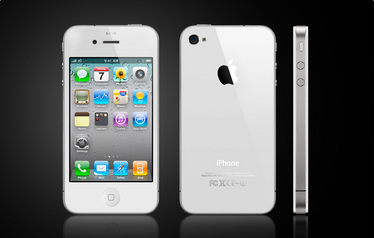i phone 4 white
Apple's release of a new iPhone – now in white! – comes just in time to distract attention from the company's denial, issued earlier this week, that it is using embedded technology in its iPhone andiPad products to stealthily track user mobility.
Skip to next paragraphRelated Stories
This new launch follows less than a week after news broke that Apple may be storing a history of the physical mobility of its users – information that critics say violates user privacy and that the company, in previous statements, downplayed, saying it does not store data that can be tracked to any specific individual.
Will the revelations about Apple's iPhone tracking dampen the now-customary rabid interest in a new Apple product? Or will the company be able to shrug off the fresh concerns about user privacy?
RELATED: Apple event brings MacBook Air, OS X Lion, and FaceTime for Mac
Smartphone tracking controversyIn a statement released via its website Wednesday, Apple said it “is not tracking the location of your iPhone” and that it “has never done so and has no plans to ever do so.”
Apple isn't alone. A separate research team reported last week that Google’s Android operating system, the global market leader, has also been collecting location data from users, although on a more limited basis than Apple.
In their assessment of the iPhone and iPad devices, independent security researchers found that the devices stored location data that dated back at least a year – far more than what the company says it needs to help update its Wi-Fi and cell tower connectivity. On Wednesday, the company said it needs only seven days of location data to reinforce its database. It blamed a bug for going back further.
That's "a plausible scenario," says Chenxi Wang, a security and technology expert at Forrester Research, adding that waiting almost a week to offer an explanation did not help Apple's credibility in the matter.
“They should have just done this right when the story broke. If [the device] is still logging data due to a programming bug, they could have said they’re not intentionally logging users,” Ms. Wang says.
For Jacqui Cheng, senior Apple editor at Ars Technica, an online media site that covers technology news, Apple’s explanation “was kind of disingenuous” because it framed the location tracking as relating to only cell phone towers and not people’s physical movements.
Skip to next paragraphRelated Stories
- It's official: White iPhone 4 goes on sale Thursday
- Smartphones: What tracking means for you
- iPhone 5: What shape will Apple's newest phone take?
- So, if your iPhone is spying on you, who benefits?
This new launch follows less than a week after news broke that Apple may be storing a history of the physical mobility of its users – information that critics say violates user privacy and that the company, in previous statements, downplayed, saying it does not store data that can be tracked to any specific individual.
Will the revelations about Apple's iPhone tracking dampen the now-customary rabid interest in a new Apple product? Or will the company be able to shrug off the fresh concerns about user privacy?
RELATED: Apple event brings MacBook Air, OS X Lion, and FaceTime for Mac
Smartphone tracking controversyIn a statement released via its website Wednesday, Apple said it “is not tracking the location of your iPhone” and that it “has never done so and has no plans to ever do so.”
Apple isn't alone. A separate research team reported last week that Google’s Android operating system, the global market leader, has also been collecting location data from users, although on a more limited basis than Apple.
In their assessment of the iPhone and iPad devices, independent security researchers found that the devices stored location data that dated back at least a year – far more than what the company says it needs to help update its Wi-Fi and cell tower connectivity. On Wednesday, the company said it needs only seven days of location data to reinforce its database. It blamed a bug for going back further.
That's "a plausible scenario," says Chenxi Wang, a security and technology expert at Forrester Research, adding that waiting almost a week to offer an explanation did not help Apple's credibility in the matter.
“They should have just done this right when the story broke. If [the device] is still logging data due to a programming bug, they could have said they’re not intentionally logging users,” Ms. Wang says.
For Jacqui Cheng, senior Apple editor at Ars Technica, an online media site that covers technology news, Apple’s explanation “was kind of disingenuous” because it framed the location tracking as relating to only cell phone towers and not people’s physical movements.

